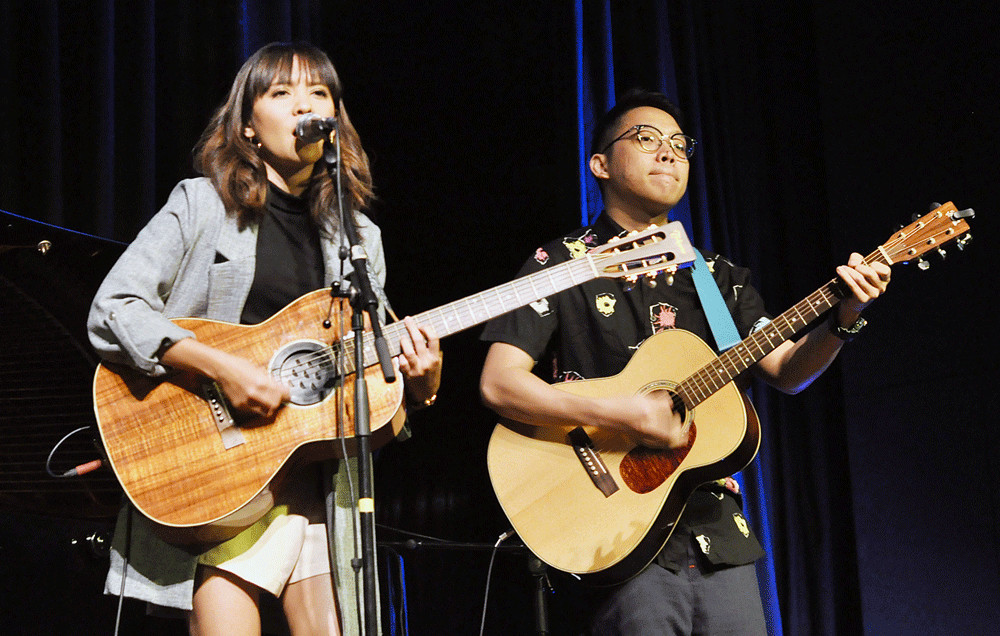Popular Reads
Top Results
Can't find what you're looking for?
View all search resultsPopular Reads
Top Results
Can't find what you're looking for?
View all search resultsThe flowers blooming from a pungent pot of dirt
Three musicians are taking a daring leap of faith to be fully independent in order to regain control over their own creative work and lives.
Change text size
Gift Premium Articles
to Anyone
O
ne fought for creative freedom, the second for the right to live life the way they want to and the third for a simple desire to live a comfortable life. To do this, they had to muster the courage to rebel regardless of the cost. Recently, they shared their experiences during a discussion called Records and Rebellions.
Hosted by the Indonesian Heritage Society at the Dutch Cultural Center Erasmus Huis, South Jakarta, the talk highlighted the personal revolution of each of the three musicians against a stifling, judgmental society.
The first of the musicians, 32-year-old indie pop singer Lala Karmela, said her rebellion was for the sake of her art.
Despite her success in the music industry, the time she spent selling her soul to major record labels took a toll on her creativity because the labels increasingly steered the direction of her music down a path that she was not comfortable with.
Having been in the industry since 2007, and having released albums under major labels in both Indonesia and her native Philippines, it was only in 2012 that Lala decided that she had had enough and struck out on her own, allowing her to make the type of music she wanted to make.
“I was told that if I left the label, I would have a hard time getting my music out there. But because I just craved a proper home for my music, the hard work just seemed like something I had to go through. I care enough about my music to go through whatever I have to for it to flourish,” Lala explained.
Her independent ambitions led her to premier indie label Shinjitos Records, where she released her third studio album, Between Us, in 2013, which was produced by prominent electronic musician and producer Joseph Saryuf.
Her initial frustrations are reflected in her lyrics, as shown in the song “Morning Star”, off Between Us: “I’m sick of your words/I don’t want to do the things you tell me to do”. The lyrics serve as a possible juxtaposition of her jaded feelings about deciding whether or not to break away from the majors and hook up with the independents.
The song itself is packaged as a love song that can also be put in the context of love; a wonderful singularity at play.
She released another album, Solina in 2016, under Organic Records that has a fun 1980s dancey sound, displaying her comfort in the music she is making.
Meanwhile, the rebellion that singer Ardhito Pramono went through was more personal — it challenged the very idea of him making music at all.
Growing up in a military family, Ardhito was at odds with his father who wanted him to follow the path of a soldier.
Ardhito spent his formative years at a military school that managed to initially shape him into that very image, but he later found out that it was not what he wanted. After this experience, he turned to music for consolation and found the beauty in songs, which had the ability to humanize his ups and downs.
“I was on a path to a life that wasn’t what I wanted. I wanted to make music after becoming immersed in it during the lowest time in my life,” he explained.
“To convey such beauty and comfort was what I wanted to do, away from the hard-hearted military style that was forced upon me,” he added, while also recalling the moment when he ran away from military school one night to confront his father and tell him what he wanted in life.
Ardhito’s music has a jazzy-pop feel to it and his songs primarily address heartbreak and a disconnect from society, whether it be through social media or life choices that society expects boys like him to pursue.
His rebellion, although personal in nature, materialized in songs that aimed to shatter the forced masculine image of boys in society and reclaiming that forced identity in an honest manner.
Hitting the right note: Kartika Jahja entertains the crowd at Erasmus Huis in Jakarta. (The Jakarta Post/Iqbal Yuwansyah)The same goes for another musician, Kartika Jahja, who takes society head-on with her brutally honest and sincere music that spawned a campaign against the forced imagery of Indonesian women.
She said music was the perfect weapon in the fight against society’s obsolete values because it also opened her mind a long time ago to what was fair or not.
“My exposure to music opened up the realities of the world,” added Kartika who was exposed to the rebellious ideals of punk and metal while growing up.
Through what she did best, she created an influential campaign to promote body positivity and female empowerment, as well as taking part in her own large-scale rebellion against societal norms that still shackle women in Indonesia.
Kartika’s rebellion was initially aimed at the indie music community that she had become a part of, addressing the difficulty of surviving in a masculine environment as a woman.
Even if the ideals of punk music are about smashing the norms that stifle your being, she felt the indie community had nothing to offer her despite its calls for justice and fairness.
Kartika discovered that being “part of the guys” meant nothing because she was still seen as somewhat of an anomaly simply because of her gender.
Traumatic experiences in the community, which involved frequent sexual harassment, made her realize that she was never part of them and when she tried to address these issues with some of her male friends, they simply laughed it off.
“I remember I was having fun playing this one show when all of a sudden a guy in the crowd right in front of me started making gestures that simulated masturbating.
“When I told the story to several people that I knew, they laughed it off as something absurdly funny, while inside I was crying. I didn’t feel safe, I didn’t feel respected, and I realized that I was merely adopting the ‘one of the boys’ role as a means of survival,” she said.
From these unfortunate experiences, which also included a highly traumatic rape experience, Kartika gathered all of her anger and disgust and produced her most profound album to date, MERAH in 2016.
Her first single, “Tubuhku Otoritasku” (My Body My Authority), made waves at the launch as it addressed the importance of women taking back control of their bodies.
In 2016, “Tubuhku Otoritasku” became the anthem of the feminist activist movement, which promoted body positivity and female empowerment. The aim of the movement is to show that it is okay for women to be who they are and what they do in a patriarchal society.
At first, Kartika used the campaign as an empowerment movement only for Indonesian women, but she quickly found sympathizers abroad. Her campaign was covered by the likes of the BBC and CNN. She was also contacted by men and women from all over the world.
Despite the international show of support, Kartika still found that the topic was not being addressed on the Indonesian indie music scene. According to her, a rebellion could only succeed if everyone was on board.
“If this rebellion aims to last, it has to be inclusive,” she said.













